#brokeback mountain was based on a short story
Explore tagged Tumblr posts
Text
a movie is a short story. a tv show is a novel. do you see what i mean?
#they should stop adapting novels into movies those are TELEVISION PROGRAMS that require MULTIPLE EPISODES#arrival was based on a short story#brokeback mountain was based on a short story#the shawshank redemption was based on a short story#those movies are so good because they can adapt everything from the short story and even add to it to make it more cinematic#if you want the filmed version of a novel to be as hefty and meaty as the material it’s based on#you have to make it at least a miniseries#thanks for coming to my theodore discussion
20 notes
·
View notes
Note
Re: your Brokeback Mountain poll reblog, no one on the writing team ever said Ennis was bi, however when the film came out (pre-gay marriage legalization in the US) the actors made a lot of claims like "Well, I just think this is a very human story about two people who fell in love with each other and they just happened to both be men"
BUT the movie Brokeback Mountain is an adaptation of a short story of the same name, and the author of that short story said that she wrote it because she wanted to explore what life would have been like in the West for a young cowboy who was gay. So based on the source material, Ennis is indeed a gay man who denies this about himself lol. Just thought I'd clarify!
Oh yeah, I googled it after and the producer of the movie said it clearly that they both are gay in the movie, like I thought!! I think they did a good job portraying that, even from just the movie it was clear he did not enjoy being with the girls at all and was forcing himself because of shame and fear :(
11 notes
·
View notes
Text

Brokeback Mountain at 20: the ‘gay cowboy flick’ now rightly regarded as a tragic masterpiece
Ang Lee’s remarkable movie, starring Jake Gyllenhaal and Heath Ledger as star-crossed lovers, was controversial and lost best picture at the Oscars – but remains a beautiful film
Some films accumulate an emotional residue over time; rather than diminishing, their impact deepens and intensifies with each screening. When I first saw Ang Lee’s Brokeback Mountain in 2005 – a movie I’d been anticipating since a “gay cowboy” project was announced – my response was subdued. I remember telling a friend who’d asked what I thought that it was beautiful in the way a landscape painting is beautiful: lush and precisely detailed but emotionally spare. These days I can’t hear the opening strains of Gustavo Santaolalla’s poignant score without weeping.
Beautiful landscape is, of course, a central feature of the film, tantalising and talismanic. The quietly stunning Wyoming countryside is not only where our cowboys fall in love – mercurial and passionate Jack Twist (Jake Gyllenhaal) and taciturn and self-loathing Ennis del Mar (Heath Ledger) – it represents the kind of emotional freedom and acceptance they can’t find in the prosaic interiors of their upbringing. Brokeback Mountain (a fictional location invented by the author Annie Proulx in the award-winning short story on which the film is based) releases something in the men, then mocks them for not living up to its Edenic promise.
It’s highly significant that the film opens in 1963 and spans a 20-year period of marriages, kids and divorce before ending in secrecy and heartbreak. This was a time of enormous progress for gay men in the US who’d fought for and won legal protections across the country. But for Jack and Ennis ��� who can’t even conceive of a world that tolerates, let alone actively celebrates, their love – this progress might as well be happening on the moon. It’s a salient reminder that what we think of as an LGBTQI+ community is largely a metropolitan, middle-class construct.
Those long opening scenes on Brokeback – where the men herd sheep, wash clothes in the river and make love in a tent – unfold languorously, as if taking their cue from the natural world; the pacing here is stately, deliberate. But as the men return to their separate lives and deep dive into the deception of heterosexuality, time seems to quicken. No sooner do we see Ennis marrying Alma (Michelle Williams) in a pokey Riverton chapel than the couple are drowning under the domestic weight of kids, bills and dead-end jobs. Jack’s furtive “romance” with Lureen (Anne Hathaway, all angles and eye rolls) also proceeds at a pace, as if keen to paper over cracks. Lee does this often in the film, telescoping time whenever the men are away from the mountain; the effect is of whole lives slipping through the protagonists’ fingers.
One of the things that strikes me rewatching the film is how specific and tactile the worlds Lee brings to life are (aided enormously by the production designer Judy Becker); from the shoddy trailers and rusted pick-ups of Ennis’s existence to the depressing austerity of Jack’s family home. Lee has always been a master of mise en scène; he uses it not just to locate and excavate character but to suggest elaborate and highly charged social milieux. This is vital in a film like Brokeback Mountain, where societal conventions are as immutable and constrictive as gravity. What we now understand as toxic masculinity, its stultifying narrowness and self-inflicting misery, pervades every frame; rigid constructs surrounding gender are as scrupulously upheld as anything in Edith Wharton or Henry James.
The cast are superb, the whole film littered with performances of astonishing depth and suppleness. I’d forgotten Kate Mara’s emergent, wide-eyed Alma Jr, wondering what exactly it is that keeps her father at arm’s length. David Harbour and Anna Faris as hopelessly entrapped married couple Randall and Lashawn Malone. Williams is heartbreaking, doe-eyed and desperate and Hathaway is terrific, her insouciance hardening to steel in the face of her husband’s vast unknowability.
Straight actors playing gay characters might have become more controversial since the film’s release (although it’s hardly in abeyance) but this never bothered me much because I could always feel the abiding respect and compassion coming from the entire creative team. Gyllenhaal and Ledger don’t “play gay” at all; the boys’ sexuality isn’t an identity to them, but something akin to a topographical detail, as inscrutable as a mountain.
Gyllenhaal is brilliant as the tortured and tenacious Jack, allowing hints of another, freer self to shine through the increasing bitterness and despair. When Brokeback was released, the US film critic Gene Shalit called Jack “a sexual predator” – which highlights the straight world’s willingness to see criminality in gay desire – but he’s really a lover in the high romantic sense, chivalric and steadfast. Ledger’s Ennis is an inversion of Jack, his chivalry petrified into stoicism and self-denial. He mumbles and shuffles, hemmed and corralled like one of the sheep, his jaw locked and his gaze shifting. It’s a remarkable portrait of a young man disappearing into himself.
Brokeback Mountain was nominated for eight Oscars and won three, but – in a move most of us at the time interpreted as a deliberate snub – lost best picture to the tediously didactic and self-congratulatory Crash. That decision looks downright silly now, as Lee’s film has taken its rightful place among cinema’s masterpieces, entering the Library of Congress’s National Film Registry in 2018 for being “culturally, historically or aesthetically significant”. It seems that love only grows stronger with time.
Daily inspiration. Discover more photos at Just for Books…?
#just for books#message from the editor#Film#LGBTQ+ rights#Heath Ledger#Jake Gyllenhaal#Ang Lee#Annie Proulx#Romance films#Brokeback Mountain#LGBTQI+
4 notes
·
View notes
Note
uh...OK so Brokeback Mountain made me cry in the middle of my Adaptations class (it was based off of a short story) but uh...imagine HalBarry in THAT situation-- & then in that scene where Jack visits Ennis and CUPS HIS CHEEKS FOR A KISS ;-;
brokeback mountain halbarry would be really fucking funny considering the one time they went camping barry pulled up with a robe and slippers and alarm clock and a picture of his wife. he's a glamper 😭
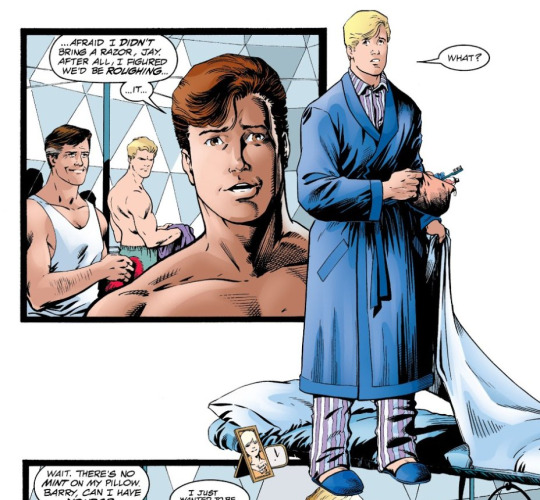
#halbarry#asks <3#ty for the ask!!#could u imagine being a cowboy and seeing ur new cowboy partner roll up with like. 10 pounds of personal effects. a houseplant even#fucking incredible
61 notes
·
View notes
Text
Fall Favorite Fic Festival, Entry 4

I'm writing this in Memphis, TN, and I can't see any red trees from my hotel window. Too far south to have gotten started, maybe. It's been very overcast. I'm here for a professional meeting, and as is always the case, they've had the AC set to "violent" in the meeting rooms and I don't know that I'll ever be warm again. You know how if you've ever gotten a sunburn, the water in the shower is warmer when it hits your feet than when it comes out of the showerhead, because it's been heated by your skin? My showers here have been the complete opposite of that.
All that to say, I'm still feeling sad, still feeling lonely, definitely facing an anniversary reaction from my sister's passing, and still quite intentionally drowning my sorrows in fic.
I had the best, most angsty fic in mind for this entry, like, call and warn @221bjen level angst, but then one day, this manip came to mind, for no particular reason:
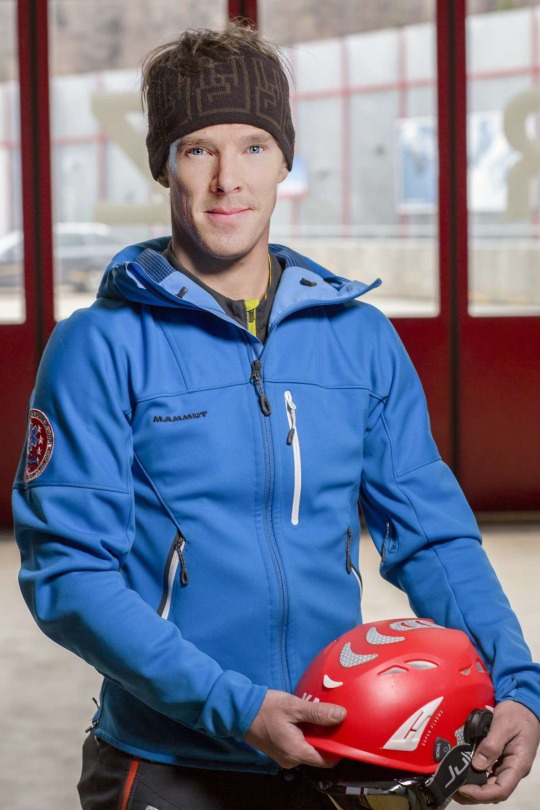
and oh, yeah, baby. I couldn't sign into AO3 fast enough. If you know, you know, and if you don't, you've got to read:
Whiteout, by SinceWhenDoYouCallMe_John
I will spare your TL by adding a cut here.
This is a fic I re-read fairly often for sheer pleasure, but that is not to say it's fluff. The author tries in the notes to make it sound like fluff, but it's Sherlock and John as part of an aerial rescue team at the freaking Matterhorn and there is ice and danger and multiple CPR events and Greg Lestrade speaking French and secrets and tears and all kinds of relationship drama and it's JUST NOT FLUFF, OK? However, it is written in a fun documentary style (Shane based it on a documentary he came across on Netflix) with mostly dialogue and camera direction and it is a quick, satisfying read.
I've had the pleasure of betaing for this author in the past, and so I've spent more than a little time thinking about his style. He is an extremely versatile writer, and I think this fic really highlights that. If you compare this style to, say, the highly descriptive and romantic (not just in the relationship way, but also in the world-painted-in-perfect-light-way) Gimme Shelter, you wouldn't necessarily know they were written by the same person within a fairly short block of time (8 months). This fic is crisp, well timed, and quickly paced, with perfectly set points of action, snappy dialogue, and not a lot of down time. Gimme Shelter moves well too, but it's a very different feeling, silky and gentle. It's like the difference between taking a shot of great tequila vs savoring a perfect Cabernet. And if that's not enough for you, please note that SWDYCMJ has also written Priestlock, a skiing OT3, a straight-ahead ghost story, Potterlock, and a Black Mirror crossover that kept me on my toes. Plus, of course, the beautiful Brokeback Mountain fusion that still breaks my heart in all the best ways.
I mentioned in my last entry how the artistry in this fandom continues to knock me out to this day, and Shane's collective work is another prime example.
I don't feel like I'm doing this fic justice, but it's kinda hard for me to talk about without ruining the surprise of it. Even discussing the structure is tricky. Just...go read it. You'll thank me later.
26 notes
·
View notes
Text
Pride - 2024: Day 2

Movie: Brokeback Mountain
Made: 2005 – Set in: 1963 – 1983
Starring: Heath Ledger, Jake Gyllenhaal, Michelle Williams, Anne Hathaway
Rated R for: Language, Nudity (boobies and buns), Violence and Sexual Content (a few sex scenes, mostly hetero)
Plot:
A romantic drama based on the short story by Annie Proulx, it follows Ennis Del Mar and Jack Twist over the course of twenty years, starting when they met herding sheep on Brokeback Mountain in Wyoming. At the end of the summer, they go their separate ways, Ennis to his home town in Wyoming to marry his girlfriend and Jack to his home and the rodeo circuit.
It’s a bit of a slow paced movie with little humor and a lot of scenery shots. A drama that doesn’t take that title lightly, it certainly serves up the cold dish of staring, cheating and hopeful hearts soon broken.
Spoilers under Keep Reading Line
Jack dies in the end
I remember when this movie came out, I was around ten years old and never saw anyone of the same gender kiss, so when they showed it on ET (or implied they kissed, I can’t really remember) it stuck with me. I don’t remember the scene they showed but I knew what it was. It was a movie with two men in a romantic relationship. It didn’t stay with me in a bad way, but as a queer kid who didn’t know they were queer (There were a few hints looking back) I hung onto it, I guess. Though I didn’t watch it until years later when I was a late teenager but never had the chance to finish (Computer crashed and I didn’t have the energy to look for where in the movie it crashed). So this time I got to watch it from start to finish and at this point I knew how it ended and was braced for it. But we all kind of know how these movies end. That being said, I do think it was a good movie. Though you don’t see why Jack and Ennis fall in love, certainly not a kind of love that hangs on for years. They spend a lot of time together but a lot of the movie just shows brief scenes of them together and then you move on. In fact, most of the movie is them trying to be happy in a heterosexual life and only small parts of them together. If you didn’t know how it ended, you might find yourself rooting for the two to find a way to work it out. But given the time period, it would be hard to be at ease and happy. I’m not really sure if Jack was beaten to death or if Ennis just imagined it as that was something he always feared would happen. I felt like Jack’s wife knew something and maybe what she said happened to him was just a cover? It was a little awkward watching it with my mom when two men got it on in a tent, but this is day two and I have a feeling by day thirty I’ll be over it :|
Mom’s Thoughts: The movie started rather slow, showing two separate trucks arriving at a certain location and delivering the two main characters. Then they stood around waiting for the boss apparently, saying nothing to each other. Once we got past this slow start, the action picked up. Jack and Ennis get to know each other over the course of the summer and become lovers. I thought the movie depicted the climate of homosexuality in the 1960s pretty well, with the two characters trying to be “normal” young men and not be attracted to each other. The story was realistic, with scenes of the two talking and scenes of herding and guarding the sheep mixed. I’m not sure I would want to watch this movie again as it’s depressing in several places. What saddened me about this movie is that these two men felt they could not be together because of the stigma of being gay. So they spent their lives living a lie and being unhappy, not being their authentic selves. Why can’t people just accept everyone as they are and not be so hateful?
7 notes
·
View notes
Text
Onstage, ‘Brokeback Mountain’ Is Still a Tragedy
Much has changed for L.G.B.T.Q. people since Annie Proulx’s short story was published in 1997. But a new theatrical version is a reminder that homophobia is far from over.
By Douglas Greenwood - Reporting from London (May 12, 2023, 5:00 a.m. ET)
In 2016, when the theater director Jonathan Butterell was considering a proposal to adapt Annie Proulx’s 1997 short story “Brokeback Mountain” for the stage, he wondered how to translate the prose’s vast landscape and insular emotions into a play.
Last month, in a central London rehearsal studio, Butterell and Ashley Robinson, who wrote the play, tried to answer that question. To help the cast connect with Proulx’s story of a cowboy and a ranch hand falling in love against the wide-stretching landscapes of 1960s Wyoming, black-and-white photographs of American plains and mountain ranges were tacked to the walls during rehearsals.
“The vastness has been there from the very beginning,” Butterell said in a recent interview. When it came to evoking the story’s emotional landscape, the director had stuck one sepia-toned photograph, of a lone cowboy in a snow-covered Wyoming, behind a pillar. The image “speaks to the bit of us that feels alone in the world,” Butterell said. “Maybe he’s at peace with this, maybe it’s the source of his agony.”
Butterell’s “Brokeback Mountain” opened in previews May 10 at @sohoplace in London’s West End. It’s the first time the story has been adapted for theater — an opera by Charles Wuorinen premiered in Madrid in 2014 — and each version now follows in the footsteps of Proulx’s text and the film that popularized it: Ang Lee’s 2005 Academy Award-winning adaptation, which is often cited as one of the best L.G.B.T.Q. films of all time.
Butterell said he was aware of his audience having expectations based on the film. “They’re inevitable,” he said, “but I don’t mind that.”
This theatrical version also has some Hollywood clout. Its lead characters, Jack Twist and Ennis del Mar, are played by the BAFTA-nominated actor Mike Faist and the Oscar-nominated actor Lucas Hedges.
In late 2016, Robinson first wrote a treatment for what he called a “memory play” based on the short story, after speaking with the composer Dan Gillespie Sells and Butterell. Robinson’s script stated that the Wyoming setting should not be conveyed “in a purely literal sense,” and his story is set in 2013, with an older version of del Mar reflecting on the years he spent with Twist between 1963 and 1983.
Proulx approved of Robinson’s vision. She has “high hopes for the play,” she said in a recent email interview. “When I read Ashley’s script several years ago, I thought he had done a fine job.”
In Proulx’s story, del Mar and Twist’s interior worlds are conveyed by an omniscient narrator. In the stage adaptation, music does much of that work.
“These two men can’t sing,” Gillespie Sells said, because “they don’t have an emotional dialogue.” Instead, a character called The Balladeer — played by the Scottish singer-songwriter Eddi Reader — sings with an onstage country and western band. “She takes us through time,” Butterell said. “Sometimes it’s from night to day. Sometimes it’s 10 years.”
“Brokeback Mountain” will be the first time its two lead actors have appeared onstage in five years. Faist, who plays Twist, originated the role of Connor Murphy in “Dear Evan Hansen” on Broadway, and has had more recent success in film, including Steven Spielberg’s 2021 remake of “West Side Story.”
Hedges “hadn’t acted in a while” when he was sent the script, he said, having been focusing on writing instead. The “Brokeback” offer and playing del Mar changed that. “There wasn’t an angle I didn’t love about this,” he said.
As the project entered its final week of rehearsals, both actors were grappling with the process in different ways. Hedges said he was experiencing “tragic and triumphant ups and downs” about his own work. “I have a day where I think I’ve figured it all out, and then a day when it all disappears,” he said. The “collective experience” of theater was daunting compared to working in film, he said, adding that onstage, “I can’t use tricks to make it through.”
Faist concurred: “It’s a challenge, and it’s terrifying,” mainly because of the expectations of having to match the source material and 2005 film, he said. “But as terrifying and frustrating as it is, I really am having the time of my life,” he added.
Butterell said that Faist and Hedges were “as men, as actors, very different creatures.” Faist, he said, had “a sense of life and vivacity,” while Hedges “has this deeply complex interior landscape that’s very much of Ennis.”
Neither Hedges, Faist nor Butterell had revisited Lee’s film since they were approached for the project. “The truth of the matter is, no matter what, he’s not Heath Ledger and I’m not Jake Gyllenhaal,” Faist said of the film’s two lead stars, who both earned Oscar nominations for their performances. He and Hedges, Faist added, would both bring their “own weird things” to the roles.
The production has forced Faist to confront his “traumas,” he said. “We can take those traumas, turn them around,” he added, and, he hopes, make the audience “think deeply about their own lives.”
Following the success of the “Brokeback Mountain” film, Proulx said fans of her text sent her fan fiction that rewrote the ending of her short story, claiming the original was too sad. She told the The Paris Review that those fans had “misunderstood” the story and stated that it was, most importantly, about “homophobia.”
This is the first adaptation of “Brokeback” to be released since the Supreme Court made gay marriage legal in all 50 U.S. states. Robinson — who lives in Brooklyn but was raised in the tiny town of Lockhart, S.C. — said he wrote it to remind audiences that gay trauma still exists.
“These stories aren’t necessarily being told anymore because of a trend to put onstage what we want the world to be,” he said, referring to the theater community. “That’s a wonderful thing to do, but we shouldn’t cancel out all of the opportunities to talk about what’s going on underneath it.”
Butterell added that the fight against homophobia was “not over” in Britain either, citing a recent spike in the number of attacks on L.G.B.T.Q. people.
“This is a tragedy,” Butterell said of the play. “Of course love exists — I don’t want it to be solemn — but the tragedy of this piece is that fear wins.”
Find this article here: https://www.nytimes.com/2023/05/12/theater/brokeback-mountain-play.html
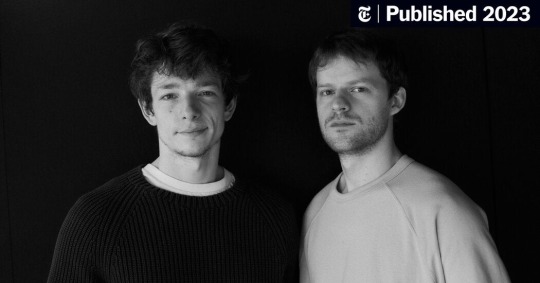
8 notes
·
View notes
Text
Breaking the Tragedy
Kinnporsche vs Brokeback Mountain meta
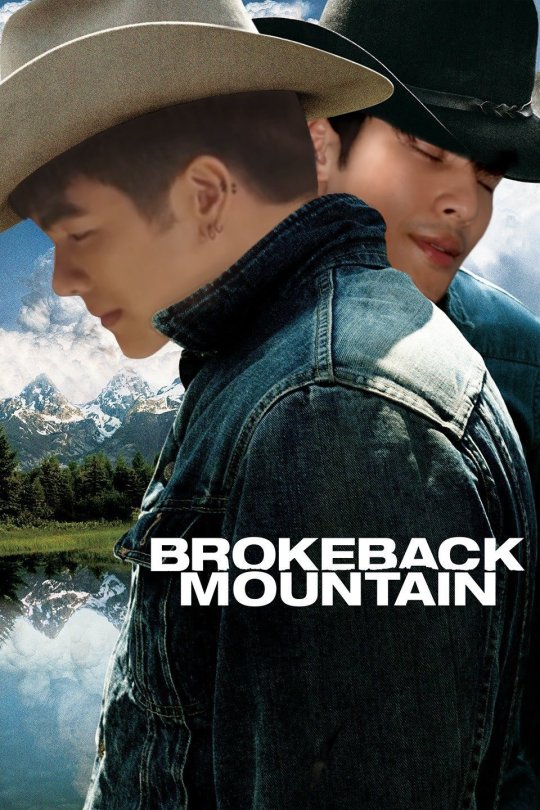
In honor of me finding out that Apo once tweeted the above poster of Brokeback Mountain with his and Mile’s pics photoshopped in, that Mile’s favorite LGBTQ movie is BBM and that for their trip to Seoul, they dressed in coordinated outfits reminiscent of BBM’s protagonists... I have lost yet another piece of my sanity and wrote some meta about KPTS vs BBM.
Brokeback Mountain the short story: America’s Greek Tragedy
I cannot do BBM justice if I don’t start by talking about the original short story that the movie is based on. I read it and it absolutely broke my heart. You think the movie is sad? It’s practically a joyous celebration in comparison with the source material.
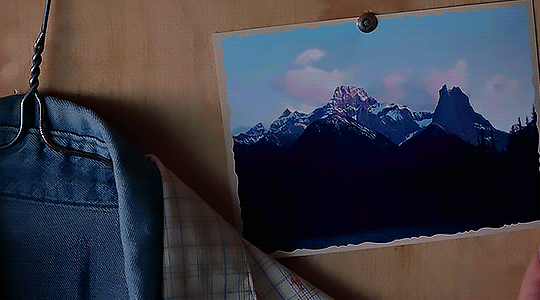
Because what Annie Proulx set out to write with her short story was an American version of a Greek tragedy. Let me explain how is a Greek tragedy, as a genre, different to tragedies in general. A tragedy is a story where our protagonist experiences an incredibly sad ending. A Greek tragedy is a story where our protagonist has a choice to make, but no matter what he chooses, he will experience an incredibly sad ending. In other words, in this genre, the real tragedy isn’t just that the ending is sad, it’s that there is no way for the ending to be anything other than sad. The impossibility of avoiding a devastating fate, THAT is the true tragedy of life.
Often this means that in Greek tragedies, the protagonist will monologue about the choice that they have, explaining to the audience why, no matter what they choose, the ending would be dire for them. The classic example is Antigone. Her brothers rebelled against her city, which is ruled by her tyrant uncle, and they were killed. The uncle, as punishment for their betrayal, decrees that his nephews would not be buried (condemning their souls eternally) and that anyone giving their bodies a proper burial will be executed. Antigone is in torment. On the one hand, human laws make it impossible for her to bury her brothers. If she does, she will be killed herself. She’s young, she’s in love, she’s about to marry her beloved, she has so much in life to look forward to. On the other hand, divine laws decree that as a sister, she must bring the bodies to burial and give their souls eternal rest, it would be a sin against her family and the gods if she doesn’t. So whatever she chooses, she’s doomed.
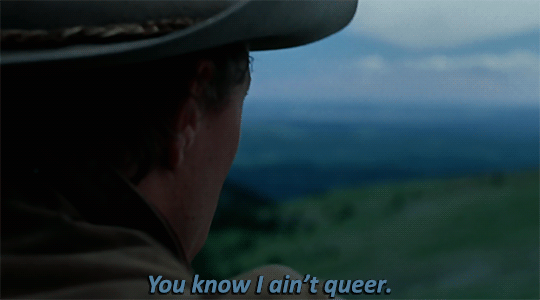
In her short story, Annie Proulx sets out to demonstrate the Greek tragedy that is the fate of gay people in the society she’s describing in her book of short stories, Close Range: Wyoming Stories. It’s a hyper-masculine, homophobic society in which non-heterosexual people have no right to exist. What Proulx tries to show is that queer people are damned no matter what choice they make in such a society, whether they pursue their love or stay deeply closeted. She will not have a protagonist who monologues about the impossibility of this choice, but she can have two characters, one choosing the former option, the other choosing the latter, and show the miserable ending that both meet.
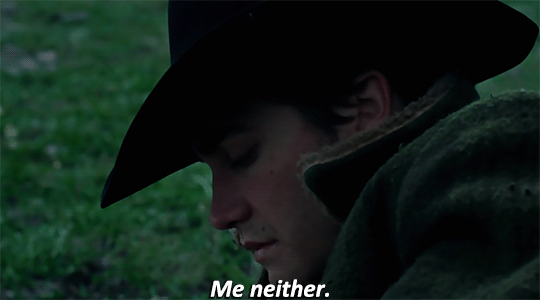
That’s who Jack and Ennis are in her short story. Jack is the guy who simply can’t remain closeted. He doesn’t come out in the modern sense of the word, but he finds he can’t stand being fully closeted, because he’s in love with Ennis. The short story makes it clear that it’s not just about attraction (an attraction not seemingly based on looks. Proulx gives a less than flattering physical description of them) and sex (though their sex is canonically damn good). What they offer each other is a mutual understanding and therefore comfort that they don’t get from anyone else in their life, not even their own families. That’s what keeps them tethered to each other, that’s what keeps them hooked even when settling with women would make everything so much easier. They do try that. But Jack is SO in love with Ennis that he’s just too damn miserable in his marriage. Jack’s wife simply can’t give him what Ennis can, and that means there is this emotional void that he can’t live with and she can’t fill. He tries to get more of Ennis, Jack has this dream that he at first keeps to himself but eventually has to share about the kind of life they might lead together, one where they wouldn’t declare who they are to anyone, but they’d live together, so they’d get to share the sorrows and joys of every single day with each other. They’d get to enjoy the warmth and love that comes with mutual understanding and comfort on a daily basis.
Ennis can’t accept this dream. He knows what happens to men who dare live like that, his father made sure his kids would see with their own eyes how a man like that was murdered. So Ennis knows how society will punish them and that they can’t lead a life that’s even semi-open about who they are to each other. He doesn’t share the dream and he chooses to settle for the few times they can get away from the heteronormative lies they’re living.

In an attempt to resist the draw he constantly feels back to Ennis, Jack turns to sex with other men. It’s still not what he longs for, but it’s better than his marriage, because at least having sex with these men is one step closer physically to what he misses when he can’t be with Ennis. Eventually, he settles into an affair with another man who would come and live with him. Jack takes what he can get, even though it’s not what he really wants. Ennis is still the love of his life, the man whose shirt Jack keeps in his closet to the end, entangled with his own, mingled dry blood and all, Ennis is the reason why Jack wanted his ashes scattered on Brokeback Mountain. Between the two impossible choices Annie Proulx lays out, Jack chooses the closest thing he can have to his dream of living his life openly with the love of his life.
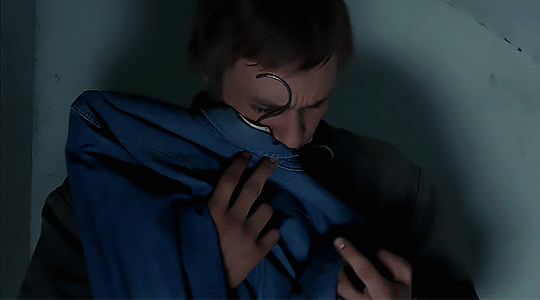
Ennis finds out that Jack was murdered for this. And at this point, it seems like out of the two, Ennis had made the smarter choice, the one of hiding who he is as much as possible. He’s still alive, he seemingly didn’t pay the price homophobia demands. Except that’s not true. Proulx then goes on to show us the real tragedy of a society that so fully embraces this type of hatred. It’s that EVERY queer person pays a price, no matter what choice they make, even if that price is invisible to us. Ennis is alive, but upon learning that Jack has been murdered, his heart dies. He becomes a ghost. All he is from this point on is a shadow of longing for Jack, hanging their two intertwined shirts in Ennis’ trailer, waking up every morning from dreams about Jack, wanting something that can never again be. There are no happy endings, there are no good choices for queer people where homophobia prevails.
Brokeback Mountain the movie: a softer lens
The movie tones that down. For the most part it follows the original short story with only a few elaborations that IMO don’t change the meaning of the source material by much. Except for the ending. That’s when Ennis’ daughter comes to talk to him, and they have a kind of reconciliation. The movie lets us understand he’s going to be there for her despite not being there before. Ennis also puts some roots down when he installs a mailbox, signaling both finding a place he’ll be connected to again (whereas the Ennis at the end of the short story is still very much adrift, not knowing what tomorrow will bring, not even where he’ll stay) and implying he’ll once again have someone writing to him. This doesn’t exist in the short story. By the end of the story, Ennis’ oldest daughter is already married, they have no special conversation about her wedding, and the only reason why she’s mentioned is that he might have to crash with her for a while if he can’t find any other solution in between jobs. Jack was the love of Ennis’ life, he’s gone, nothing will bring him back, nothing will give them the life they should have had together. There is no comfort, there is no consolation prize in Proulx’s tale. You can’t fix a Greek tragedy. You just gotta stand it.
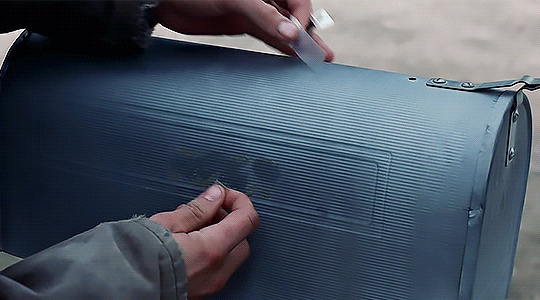
So the movie is different. It’s not an inevitable tragedy that cannot be escaped and cannot be healed. The film ends instead with an offering that every life (even one in which everything that was ever important to you seems lost and unfixable) can hold some solace. Lost the love of your life? Experiencing immeasurable grief without even having the possibility to talk about it to anyone? You can still be there for your daughter’s wedding. You can still do one thing right. Does that fix it all? No. BBM the movie does recount a tragedy. It does follow a powerful love story and its destruction. But the film isn’t a Greek tragedy, either. You might have lost almost everything because of homophobia, the movie says, but you can have something.
At the same time, something both versions have in common is the title (obviously) which refers to the mountain where Jack and Ennis fell in love, the place that broke their lives and turned them into tragedies. This mountain becomes an image in their minds, a symbol of that moment in time when they were young, in love, happy and had the illusion that they always could be. Both versions tell the story of an all-encompassing love and the devastating effect of losing it due to homophobia, even if the film’s criticism is somewhat softened by the more hopeful ending.
Kinnporsche the Series: breaking the tragedy

On the most basic level, KPTS is easily comparable to BBM because they’re both set in a tough, hyper-masculine, demanding and merciless world. One might argue that Kinn and Porsche are in an even worse version of that than Jack and Ennis, because the mafia world is also a violent one by its very nature, whereas BBM tells the story of a society that is supposed to be civilized, though in reality its violence lies under the surface. The threat of it is very real for gay people, as our protagonists both learn firsthand, but that’s because homophobia provides a small break in the surface where violence can erupt with society choosing to turn a blind eye to it.
But against expectations, Kinn and Porsche exist in a hyper-masculine world that does not fall into the pit of homophobia. It’s not that homophobia doesn’t exist in their world at all. We do know that somewhere out there, people are homophobic in the society that the characters of KPTS live in. The show doesn’t deal too much with it, because our protagonists are simply spared any encounters with this homophobia, at least on screen.

How do we know that it does exist in their society? There are small hints, like Porsche being told in ep 108 that “Love is love” (first stated by Jom, then repeated by Yok). We all know this to be an anti-homophobia statement, and there is no need for it in this world had it been free of that kinda hate. But the matter is most explicitly brought up after Porsche discovers Kinn is gay. It turns out, Porsche is shocked not because of this revelation, but because Big sent him into Kinn’s bedroom, despite knowing about the sexy times happening there. But then Porsche realizes Big expected him to have a homophobic reaction, and so he goes off about that. This moment tells us Porsche himself isn’t homophobic, but he is aware of the existence of such attitudes.
This scene also points to the existence of homophobia in this world by hinting Porsche’s guess regarding Big is correct. After all, Porsche was bragging about having gone to the sauna together with Kinn, and that he would invite Big next time, implying there’s been a change in who is now the favorite bodyguard. Big, who is secretly in love with Kinn, was obviously jealous and wanted to do something that would destroy this newfound closeness. Big sent Porsche into that bedroom to witness Kinn’s gay sexcapades, expecting that the presumed heterosexual Porsche would react in a homophobic manner and would wanna get as far away as possible from their gay boss. In fact, Big lurks outside Kinn’s bedroom, and he’s completely unsurprised to see Porsche fleeing and shocked. Big’s confusion only starts when Porsche explains the actual source of his distress. Big’s bafflement indicates to us that homophobia was, in fact, the reaction that he was counting on.
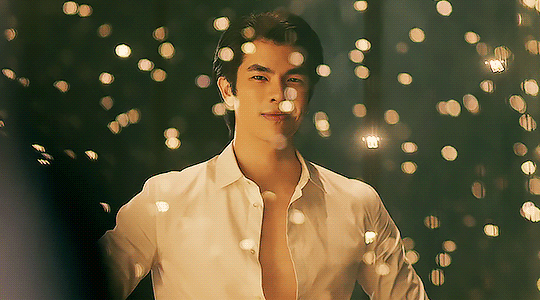
Last thing about this scene which tells us that homophobia does exist somewhere in the background of KPTS’ world is Kinn’s own reaction. We discover that he was close by and heard the entire exchange between Porsche and Big. If homophobia was not an issue, then Porsche revealing himself to be free of it wouldn’t have mattered to Kinn so much. But instead, we witness this big grin blooming on his face, as he stands there, happy and literally illuminated. We never hear whether Kinn himself had ever suffered homophobia. As a mafia prince, he might have been spared its repercussions. But he’s aware of it enough that he must have known there’s a chance Porsche, who had up until then been straight and assumed others around him to be as well, would be homophobic. That’s what Kinn’s smile tells us, it’s his joy and relief that this guy he’s started having feelings for does not harbor that prejudice. And that whole bit doesn’t work, that smile isn’t anywhere near as meaningful, that scene doesn’t require the metaphor of illumination, unless homophobia does exist in KPTS’ world.

(as a side note, since I brought up Porsche’s sexuality, I’ll mention that in both stories we have guys who are presumed straight by their environment, by the narrative and even by themselves, and who discover their attraction to another man. In neither story do we get clear answers and definitions for how they identify, for example as gay or bisexual, in any modern sense. In Jack and Ennis’ case, claiming their identity by defining it would simply be too dangerous due to the homophobia around, not to mention the bits of it that they have internalized. When it comes to Porsche, there’s no need for labels, because those simply don’t matter to him. “Love is love,” he’s in love with Kinn, and that’s all Porsche needs to know the second that he accepts these feelings. He is unsure at first over never having dated a guy before, but when he talks to Yok about it in 108, he sounds more confused over not knowing how to date than about the fact that he’s looking to romance another guy)
KPTS offers us a hyper-masculine setting that co-exists with homophobia, but is mostly untouched by it. Through all the challenges KPTS’ protagonists have to face, none are about being attracted to another man. If BBM tells us how homophobia destroys people, KPTS presents a picture of how they can thrive in its absence. Because while the finale isn’t complete (as I indicated in my KPTS s2 meta), this show’s ending is still a tale of how love between two men saves the day.

Which brings me to another point. I think the biggest resemblance between KPTS and BBM comes when we consider the tagline for the movie. “Love is a force of nature,” the film’s poster reads, as Jack and Ennis’ portraits take up most of its space, seemingly bigger than the mountain their love was born on. BBM at the end of the day might be about the tragedy of homophobia, but it also affirms the undeniable power of love, so overwhelming that nothing can truly stop it. After all, not even what he experienced as the ultimate rejection could make Jack stop loving Ennis, and death itself couldn’t make Ennis stop loving Jack.
We see something so similar with Kinn and Porsche’s story as well. When they meet, they’re both men who aren’t looking for love or happiness. They’re both settling for just sex. One had been betrayed by a former lover so badly that he doesn’t believe in love anymore, the other has never even given love a chance because he’s too dedicated to raising his kid brother, leaving himself emotionally unavailable for a relationship. But when they meet each other? That’s a whirlwind that throws their lives into disarray, opens them up to love and to the possibility of loving someone who’s different than they expected (Porsche falling for a man, Kinn falling for someone who fights back, unlike the appeasing, docile men he’s been with before), and saves them from being destroyed by hurt even as they experience betrayals of all kinds.

And so unsurprisingly, these two epic love stories have many similarities. KPTS and BBM alike, perhaps precisely because of that hyper-masculine context they portray, give us protagonists whose first time acting on their mutual attraction involves alcohol being consumed by both men. For Kinnporsche, it’s their first kiss in 103, which follows partying up together at Yok’s bar. For Jack and Ennis, it’s the first time they have sex after they’ve drunk so much that Ennis can’t leave the camp for the night by riding away. Which inevitably leads to another similarity between these two couples, that this is a starter happening on a physical level, but it will lead both down a path of emotions realization.

Of course, emotions are complicated, especially for men who aren’t that great at communicating (which tends to be almost all of them when we’re talking about guys who exist in hyper-masculine settings). Jack and Ennis, when they have to part ways and they don’t know how to express the pain of that, they end up throwing punches at each other on their last day on Brokeback Mountain. Similarly, Kinn and Porsche, when they care about each other so much, but the possibility of Vegas coming between them arises, they end up turning to a shove, a slap and some insults, hurting each other because they themselves are in pain. But since this is also just a symptom of how much they care about each other, then eventually, in both cases, it is the depth of their feelings for each other that helps them to overcome their trouble in communication. They return to and help heal each other.

Then, there’s also that understanding and comfort these men offer each other. In BBM, the peak of this is represented in a moment when Ennis pulls an exhausted Jack to him and repeats words he had heard as a kid from his mom. This is the softness and care that drives them out into the wilderness several times a year, no matter what else is happening in their lives, and into each other’s arms. Despite all the hurt Ennis caused Jack on their last day together on Brokeback Mountain and on every occasion when Ennis rejects Jack’s dream of living together, in spite of all other measures Jack turns to in order to deal with the hurt, he never stops seeing Ennis, untangles their shirts or changes his will. On Ennis’ part, even when Alma tells him she knows his secret, even when he realizes his life could be in danger because he and Jack were not as invisible as he thought they were despite their precautions, Ennis doesn’t stop seeing Jack either. They are bonded together. And that’s what we see with Kinn and Porsche, too. No matter what surprises are thrown at them, no matter what betrayals, no matter how reality is twisted around them to make them doubt their own minds, they don’t stop trusting each other. They keep choosing each other throughout the show and especially during the finale. And their trust and understanding is also built on tender moments, similar to the one Jack and Ennis shared, such as when Porsche is taking care of Kinn’s hair, reminiscent of how Kinn says his mother used to do the same for him when he was a kid.

Lastly, these great love affairs aren’t just a bond of compulsion, where they have to return to each other. They’re also a bond of choice, a commitment that they want to make, even if it’s not one that society is ready to recognize. “Jack, I swear,” says Ennis to a pair of shirts he has just hung in his trailer next to a postcard of Brokeback Mountain, two shirts that Jack joined together and Ennis would never put asunder. A symbolic wedding vow. Their own little ceremony that they end up sharing by virtue of Ennis continuing what Jack had started even after he isn’t there anymore. This symbolic commitment is one we also see with KPTS in ep 114, first when we know Kinn is the one who has put a ring on Porsche’s finger (one that matches his own and marks them as partners who lead their extended mafia family together), and second when they exchange their own vows on the boat. It’s the same one where Kinn demanded Porsche’s life as his bodyguard back in ep 101 and was refused, but this time Porsche is committing his whole life to Kinn and is being promised in return that he’d be treasured.
Kinn and Porsche broke the inevitably tragic nature of the BBM world. At the end of it all, it’s not only the relative absence of homophobia that makes the difference. That detail is crucial! Their story would have been completely different if they would have had to cope with what Jack and Ennis did. But another element that makes a difference is the trust in each other that Kinn and Porsche manage to build. I’ve talked about the importance of that in my previous Kinnporsche meta posts (about the sex scene in 107, as well as KPTS s2 meta) and how we can tell that they would have eventually beaten any adversary and all hardships thanks to that. It’s something that Jack and Ennis, as much as they loved each other, didn’t manage to get to. They never learn to trust each other enough to communicate properly. Ennis is afraid of Jack’s wrath when he has to cancel one of their planned meetings, so he keeps it a secret until the very end of their current tryst. Jack knows better than to share with Ennis what he does with other men in order to get over the emotional loneliness he experiences whenever they part. Maybe in a less homophobic society, they would get to where they stop disappointing each other and could have faith in one another.
So that trust that Kinn and Porsche put in each other? That’s actually a huge thing. Because in a sense, Kinn and Porsche’s backgrounds as they unfold at the end of KPTS unveil they easily could have ended up as a tragedy as well. Their story is that of two young men who are caught in a war started before they were even born by Kinn’s cruel grandfather who we never even see on screen. This head of the family is cold and manipulative, turning brother against his own brother and shaping both his sons into being like him. He’s also responsible for violent acts, one of which brings Porsche’s mom as a young girl into the lives of his sons, setting off a whole chain of events that will end with the bloody war between the two mafia families that we witness in the finale. This is precisely the type of background that in Greek mythology curses a whole family and dooms all of its members, even the ones born generations later. In fact, it’s those younger generations who become the very essence of Greek tragedy. They are fated to meet a terrible end no matter what they choose to do, despite them not being responsible for any of the atrocities that curse their family, and their fate is set before they were even conceived.
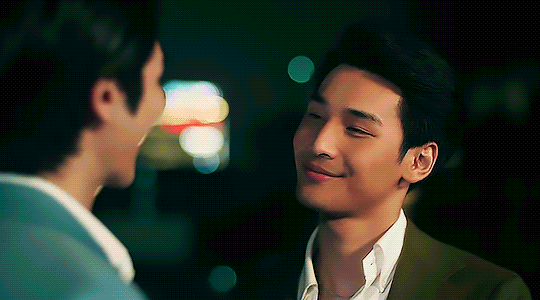
Kinn and Porsche could have easily become these tragic figures as well. But KPTS breaks the cycle of tragedy through the bond its protagonists created. Where the family of Kinn and Porsche is torn apart by hate and envy, they change the course of their fate by finding love together, as well as a desire to support and make each other happy. And where Jack and Ennis failed to trust each other, Kinn and Porsche manage to build that foundation, and make it a stable one. That’s powerful enough that when the events of the past start surfacing, whether more recent (Vegas and Tawan) or less (Korn and Gun, Porsche’s parents), threatening to tear our lovers’ faith in themselves and the other one apart, they manage to hold on, trust and choose each other still. Which leads us to that last scene on the boat, the one where they commit themselves to one another, sealed by them physically holding each other, safe in the knowledge that they’re truly and completely in love, that they would die for each other, and that, thankfully, now they get to do something better. They get to do what Jack and Ennis could only dream of. They get to live the rest of their lives with each other.
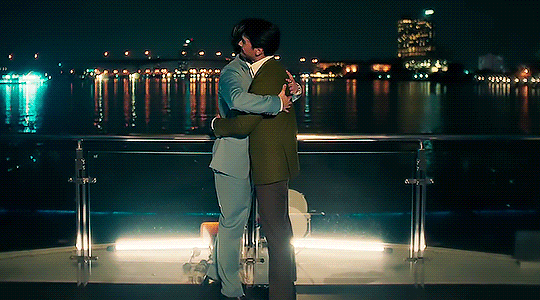
~ * ~
more: (pool sex mini meta) (all my KPTS meta on AO3)
~ * ~
As a bonus, here’s Brokeback Mountain’s theme, and Jeff Satur’s Why Don’t You Stay. They’re not similar, but WDYS’ opening always reminded me a little of bits of the BBM theme.
youtube
youtube

#mkp#mile phakphum#mile phakphum romsaithong#apo nattawin#apo nattawin wattanagitiphat#kinnporsche#kinnporsche meta#kpts#kinnporsche the series#kinn x porsche#kinn theerapanyakul#porsche pachara#mileapo#kpts meta
67 notes
·
View notes
Text
My favorite books I read in 2024
(*spoiler: they are all gay romances /tragedies*)


Swimming in the Dark by Tomasz Jedrowski
5 stars
Set in the 80's in Poland. Loved the way this book was written- I can't stress that enough, the language was really beautiful. Shows the struggles of political issues during that time. No happy ending but it made a lasting impact on me.
Call Me By Your Name by Andre Aciman
5 stars
I've never cried over a book so badly before- I gave myself a migraine. And then I cried again when I went through and tabbed and highlighted it.
It's slightly controversial because of the ages of the characters, but I really related to Elio on a certain level for some reason. No happy ending.
Fine Me by Andre Aciman
4 stars
A lot of people don't like this sequel, but I enjoyed it for the most part. It gives you the ending you want in the first book, and I actually enjoyed the POV from the father. (I know many people thought this was irrelevant but I actually think it was important.) It did start a bit slow though and took me a bit to get into.
Brokeback Mountain by Annie Proulx
4 stars
I honestly didn't know this was based on a short story until a few months ago. I read it within an hour or two since it's very short. It was very sad though, to the point that I'm too scared to watch the movie still.
What Belongs To You by Garth Greenwell
4 stars
Sheesh, idk where to start with this book. The way it was written was very challenging to read- to the point where I almost quit this book a few times. But, I was so curious about the characters that I kept coming back to it.
Overall, a very dark, gloomy atmosphere to this book. It honestly made me never want to go to where this book takes place (but I know that's not a fair way to judge a place.) It just seemed so, so depressing and awful.
Parts of this book were honestly disturbing. The details for every little thing were so descriptive that I can't believe this isn't an autobiography or a true story.
I'm still glad I read the book, but it was pretty hard to get through.
Giovanni's Room by James Baldwin
4 stars
Deemed a classic, and in Swimming In The Dark the main character loves this book, which is what made me curious enough to finally read it.
Not sure what to say about this one other than it was sad and complex, and nothing ended well for anyone.
Lie With Me by Phillippe Besson
5 stars
(this book was translated by Molly Ringwald, so that's random and interesting to me)
I really liked this one. I loved the way it was written, and the setting in the French countryside.
The passing of time in the book was also interesting. .. I'm realizing now this book is hard to talk about without saying too much. But once again, no happy ending.
Tin Man by Sarah Winman
4 stars
Kind've hauntingly beautiful. The only thing I disliked about the book was that the timeline was a bit confusing as it kept jumping around. But overall, I did enjoy the story and it stuck with me for a while.
Anyways, if you see this post and you also like these books and have any book recs, let me know! 😊🖤
#books#swimming in the dark#tomasz jedrowski#call me by your name#find me#andre aciman#brokeback mountain#annie proulx#what belongs to you#garth greenwell#giovannis room#james baldwin#lie with me#philippe besson#tin man#sarah Winman#2024 reads#2024 reading#reading wrap up
6 notes
·
View notes
Note
howdy howdy, it’s the Megatron one ;; I want an emoji combo bcus I like having emoji combos ermmmm…. BUT YEAHZ I have fallen in love with a certain actor and that means his most popular character is comin with me as an F/O !! ( ; char in question is Jack Twist Broke Back Mountain 2005 ) evil laughter
-⚙️🦴 Anon ! : D
cog bone. ALSO BASED BROKEBACK MOUNTAIN IS FANTASTIC I highly recommend reading the short story the movie is based on if you haven't it's so beautiful. I love it to bits.
#f/o#f/o community#fictional other#self ship#self shipper#self shipping#selfship#selfship community#selfshipper#selfship affirmations#⚙️🦴
5 notes
·
View notes
Note
I've seen Barkskins!! It's actually so spectacularly good, I really enjoyed it!! But be warned, it unfortunately got canceled after the first season, so it does feel like there are some things in the story that didn't reach a proper resolution. Still worth the watch imo though!!!
Thank you!! I'm definitely adding it to my list of things to watch. I looked it up and the author of the book the show is based on also wrote the short story "Brokeback Mountain". I feel like that's my curse too is to get into shows that get cancelled too soon lmao
4 notes
·
View notes
Note
saw you post a lot of brokeback mountain content so i want to know if you have a list of your favorite brokeback mountain fanfic :)
I do post a lot abt Brokeback Mountain, but I've never actually sat down and made a formal, ranked list of all the Brokeback fics I love?? I have a collection on ao3 called "My Favorite Fanfics" which is where I put fics that I like beyond a simple bookmark, and there are more BBM fics in there than any other fandom I've read for haha. Unfortunately, this list isn't actually comprehensive as there are many that were either exclusively posted to the old BBM LiveJournal groups, or they were posted to LJ then later deleted and are now word documents that get passed around by email.
If I were to rank my fave BBM fics in a top 10 list, it'd look like this:
10. Once Upon a Time by rhye
A happy-ending ranch AU composed of short chapters based on fairy tale themes. As in fairy tales, some plot elements may be far-fetched, the angst runs deep, there is fluff, and they all lived happily ever after.
9. Life Ain't Easy by Creed Cascade (creedcascade)
Jack convinces Ennis to come work on the Twist Ranch after they leave Brokeback Mountain, but life ain’t easy.
8. Come Hell or High Water by Just_K
Ennis Del Mar makes the decision to leave his simple life behind and follow the brazen Jack Twist across the state of Wyoming. With life in Texas heavy on their mind, the two come to realize that dreaming big comes with a price. Will they be able to hold together when the past threatens to tear them apart, or does love truly conquer all?
7. A Place to Hide by Way2
A possible portrait of Jack's relationship with Lureen during the years prior to his reunion with Ennis.
6. it could get easier (if you want it to) by biblionerd07
Ennis decides he has more to say after their fight at the trailhead, so he makes a phone call. And it changes his life.
5. A Various Language by Destina
This is the happy ending they deserved.
4. The Sky Above by mediumorange
August, 1983. Ennis’ postcard to Jack has come back stamped ‘Return to Sender.’ He finds Jack in Lightning Flat, determined to help his father save the failing Twist ranch. His father does not want to be saved.
3. Roots by 271horses
This story tells the complete life story of Earl and Rich. It follows them from deprived childhoods, through the maturation process, the events that bring them together, and the deep, abiding love that grows between them.
Unfortunately I can't link this one as it lives in a word doc, getting passed around from email to email after 271horses purged his LJ acc. It's fantastic, tho! A lot of users on the old Brokeback forums hold it in high regards, as you'll see lots of posts mentioning the great BBM Earl/Rich prequel fic and how good it is.
2. Somebody, Somewhere by mediumorange
If you can't fix it, you've got to stand it. Slowly but surely, Ennis finds a way to stand it.
1. Widower for One Year by 271horses
This story concentrates on what would have become of Ennis after he was left alone trying to deal with the finality of his loss in that beaten up old trailer, still mired in his miserable life.
This one is another one of those that gets passed around through email and I consider it one of the greatest tragedies of the fandom bc it is, no joke, the BEST fic I have ever read in my god damned life, but it was never finished. 271horses purged his LJ acc before finishing it. I actually stopped reading once I got close to the end bc I don't want to deal with the fact that it will never be completed, so for me to confidently call it the best fic ever without actually having finished it says a lot.
#keep in mind my tastes are always in flux so this is what my top 10 list would look like today#but there are a lot of contendors for spots 7-10 tbh so it was hard to choose#thank you for asking tho ive kinda been wanting to rank my faves 🤔 i did this for usuk fics all the time but havent gotten around to#doing it for bbm fic until now#brokeback mountain#fanfic#fic ref#fic rec#ennis del mar#jack twist#still brokeback posting#asks
35 notes
·
View notes
Text
i just watched brokeback mountain.
why is the pop culture idea of the movie that its about gay cowboys who have gay sex and ends tragic? while yes, that happens, much more happens? i think the movie is more about broken relationships. about a guy whos been lost for most of his life, who doesnt learn to feel his emotions but is forced to open up.
maybe i just got a wrong impression by simply hearing people talking about it? i still liked the movie much.
(also omg, as a non american, the english sometimes was very hard to understand. even more whenever they whispered)
little thing (i dont think people care mich about brokeback mountain spoilers but still, here i go): i had to hold back tears. the scene of ennis imagining what the death possibly looked like, based on the fears instilled in him in his childhood. like he was expecting that to happen to jack.
and the scene of him and his daughter in the end, made me even sadder. knowing that no one will ever get to know of the relationship jack and ennis had. he has to mourn him like a friend and not as whatever they relationship was.
i am going to watch more movies!!!!! but i also wann read the short story of brokeback mountain, maybe ill enjoy that too
#my talk#mytalk#id remember which of those tags i used whenever i wrote sum thoughts out? oh well#mything
2 notes
·
View notes
Text
'‘Mesmerizing Masterpiece’
Gay people are rarely depicted with respect in movies today. Hollywood has often ignored homosexual men that climb back-breaking mountains. Out of shame, filmmakers avoid telling stories about gay lovers calling each other by their name. Despite homosexuality rising in the U.S., movies scarcely shine moonlight on queer people’s plight...
Few films I’ve seen have captured barriers experienced by LGBTQ communities treated as strangers as powerfully as “All of Us Strangers”. Intimate, heartbreaking and sweeping, it captures adversities experienced by LGBTQ communities. Andrew Haigh pays tribute towards gay communities today. Boasting exquisite production-design, thoughtful storytelling and phenomenal performances, it’s a mesmerizing masterpiece. Viewers aren’t required to identify with the LGBTQ community to appreciate it. Ultimately, its universal message has abilities to resonate with everyone impacted by lifelong relations with parents from an early age.
Based on the novel “Strangers”, “All of Us Strangers” chronicles the life of a queer man facing barriers. Andrew Scott embodies Adam, a middle-aged gay man mourning parents’ deaths in 1980’s Britain. To overcome grief, Adam bonds with gay neighbor Harry (Paul Mescal) providing comforting relief. However, Adam’s life changes when he begins envisioning ghosts of parents that died in car crashes years ago. Feeling like a stranger in family, Adam struggles disclosing homosexuality.
Andrew Haigh gravitates towards communities that are gay. A British gay filmmaker, Haigh has often told stories of LGBTQ communities today. His debut “Weekend” examined short-lived romance between gay lovers over a weekend. With “All of Us Strangers”, however, Haigh crafts a period piece. It’s the filmmaker’s attempt dramatizing LGBTQ communities in the 1980’s, but he succeeds. Through spellbinding cinematography, Haigh captures a queer man’s journey. Evoking Ang Lee’s “Brokeback Mountain”, Haigh uses montages to capture bonds between gay lovers. It sparked joyous memories of bonds with a cousin I wasn’t aware kept homosexuality shrouded in secrecy. Montages are complicated. Richard Curtis’ “About Time” suggested, montages elevate time-travel movies. As Spike Jonze’s “Her” demonstrated, montages elevate science-fiction. Nevertheless, it succeeds. Alongside cinematographer Jamie D. Ramsay, Haigh commemorates LGBTQ communities. Haigh captures back-breaking barriers of queer men, manufacturing theatrical viewing.
If stories of queer lovers don’t attract you towards theaters, however, there’s reasons to see “All of Us Strangers”. Accompanied by production-designer Sarah Finlay, Haigh uses symbolism capturing negative impact of homosexuality on parent-child relationships. Throughout the film, Adam’s childhood home symbolizes his sexuality. For instance, symbolism elevates the father conversation scene. During this heartbreaking scene, Adam pulls off intimidating tasks of disclosing sexuality to a father that showcases rare understanding. One appreciates set-design of the house in styles recalling Luca Guadagnino’s “Call Me By Your Name”. Like Elio’s heartbreaking conversation with his father about Oliver, Adam’s dad embraces his sexual orientation. It reminded me of my cousin’s desire to be accepted by his father after revealing sexuality in countries where homosexuality was unaccepted. Moreover, the music is magnificent. Evoking Jonathan Demme’s “Philadelphia”, it captures an era of homophobia. Through phenomenal production-design, Haigh honors queer communities.
Another extraordinary aspect of “All of Us Strangers” is storytelling. Haigh’s screenwriting strength is demonstrating struggles of homosexual men seeking acceptance by silence. In Hollywood, most movies rarely address negative impact of stress on queer people’s success. As a case in point: Bryan Singer’s “Bohemian Rhapsody” depicted Freddie Mercury as an invincible musician overcoming barriers of homosexuality by composing melodies. Fortunately, however, “All of Us Strangers” avoids pitfalls. Inspired by Barry Jenkins’ “Moonlight”, Haigh expertly uses sequences of silence to capture the LGBTQ community’s plight. Like Chiron’s silent withdrawal from his family due to his sexual identity, Adam drifts apart from his family. Silences elevate the scene where Adam says heartbreaking goodbyes to parents that realize his sexuality to be a shocking surprise. It reminded me of broken relationships growing distant from a cousin I appreciated after discovering his sexual identity. Minimal dialogue is tricky. Charlotte Wells’ “Aftersun” suggested scenes of silence elevate dramas about father-daughter relations. As Saim Sadiq’s “Joyland” demonstrated, silence elevates Pakistani transgender dramas. Nevertheless, it succeeds. Through a spectacular screenplay, Haigh commemorates gay communities today.
One admires astonishing performances.
Andrew Scott delivers a career-defining performance as Adam. Scott achieved fame playing a villain seeking to shock on BBC’s series “Sherlock”. Drawing from personal experience, Scott embodies a queer man seeking social acceptance. It’s challenging embodying a gay man during the 1980’s, but Scott succeeds. Evoking Hugh Grant in James Ivory’s “Maurice”, Scott embodies a queer man struggling pursuing homosexual relationships in a world without peace. With mesmerizing expressions, he captures angst, loneliness and resentments of a queer man. It’s a phenomenal performance.
The supporting cast is sensational, building familial bonds. Paul Mescal is phenomenal, demonstrating acknowledgements of a queer man that can’t help but fall in love in a relationship doomed to face downfall. Claire Foy is captivating, showing despair of a mother unable to care for a son that’s queer. Last, Jamie Bell merits acknowledgements. As Adam’s dad, he’s heartbreaking.
Finally, “All of Us Strangers” earns appreciation of viewers for celebrating gay wallflower teenagers. Evoking Stephen Chbosky’s “The Perks of Being a Wallflower”, the film captures barriers of queer teenagers. It tackles universal themes including family, identity and trauma. Viewers aren’t required to identify with LGBTQ communities to appreciate it. Anyone sharing strong bonds with parents at an early age will identify with the film’s message. Therefore, “All of Us Strangers” pleases all viewers.
Fans of LGBTQ Cinema will definitely acknowledge “All of Us Strangers” and so will movie-goers giving acknowledgements to sexuality. A powerful drama, it proves stories of queer men battling homophobia in Philadelphia are worth telling in Cinema. A soul-stirring tribute to queer men whose disclosure of sexuality to family incites institutionalization despair, it could make people aware of a burden that gay communities rarely getting acknowledgements bear.
A magnificent depiction of plight faced by LGBTQ communities beneath moonlight, it’s a marvelous reminder of gay men hiding sexuality in plain sight so that their parents are able to sleep soundly at night.
Like doomed affairs between queer lovers that call each other by their name, it’s a sad reminder of the struggles faced by gay men keeping sexuality shrouded in secrecy to avoid causing their family shame.
If movies can celebrate gay communities breaking backs climbing big mountains today, hopefully it leads people to honor joyous memory of queer people whose sexuality came with a painful price to pay.
As powerful as Adam’s memories of parents which died, it has inspired me to honor a cousin which took pride in sexuality becoming a guide in whom I could confide in countries where queer communities denied equal rights were pushed aside.
5/5 stars'
#Andrew Scott#Paul Mescal#Jamie Bell#Claire Foy#Andrew Haigh#Weekend#All of Us Strangers#LGBTQ+#Strangers#Sarah Finlay#Jamie D. Ramsay#Call Me By Your Name#Aftersun#Sherlock
1 note
·
View note
Text
For sleepy_gee's Snowjanus Week 2
Prompt: Literature
Based off the heartbreaking short story by Annie Proulx, Brokeback Mountain.
Enjoy!
#snowjanusweek2#snowjanus#snowjanus fic#fic by me#depressing as well#major character death before noon??
5 notes
·
View notes
Text
Is Brokeback Mountain a True Story?
Brokeback Mountain directed by Taiwanese director Ang Lee saw the theatres in the year 2005. Primarily, a romantic-drama set in old west theme introduces us to two American cowboys Jack Twist and Ennis Del Mar; the story takes us through their terrain like lives after they meet in 1963 while working as sheep herders on pastures of Brokeback Mountain. The film keeping their relationship at its core threads various phases of Jack and Ennis lives as they ride ahead. The depiction of Homosexuals in a Homophobic society makes it first one of its kind.
Ang Lee won his first Academy Award as Best Director for this movie. Jake Gyllenhaal and Heath Ledger gave two brilliant performances in their respective roles each demanding attention when on-screen, the cast also consisted names like Anne Hathaway, Michelle Willaims, David Harbour, Kate Mara.
Is Brokeback Mountain based on a true story?
The technically correct answer to this question would be a ‘NO’, the movie was adapted from a short story penned by Pulitzer fame American novelist Annie Proulx, the screenplay being written by Larry McMurty and Diana Ossana.
Fictionally the story is about these two characters and their love and journey of twenty years from 1963 to 1983 but it in actuality it’s the untold stories of all those Jack and Ennis that really existed in the fog of homophobic society.
In the early 1960s to late 1990s homosexuality was dangerous notion to have in U.S, several hate crimes that occurred in these times are the alibi of the aforementioned statement until 2003 when Lawrence vs Texas case brought a change in the laws. Jack and Ennis discover each other sexually, emotionally on Brokeback Mountain in Wyoming and keep seeing each other secretly in the name of fishing trips to hide from everyone. Duality in their lives makes the viewer a part of their journey since many of us live in duality, they prioritize responsibilities over love. Each of two leads get married to a woman but finding them in the want of each other’s company; the excitement in the body language and eyes of characters when they meet tells us all we need to know. Each of characters have different stands; Jack being more confident wants to have a life with Ennis divorcing his wife whereas Ennis even though divorced is afraid of the thorns of society they live in. In one scene Ennis says “If this things grabs hold of us again in wrong place, wrong time, then we are dead” all the while thinking about the thought process of his late homophobic father.
As the story rolls ahead both of them finds it difficult to maintain their dual lives showing the frustration and fits of rage in various altercations they have, both Jack and Ennis are distanced from their respective wives. Even through the tough times their love and emotional connection stays strong but they are not able live it to fullest. They live of the moments they spent together in Brokeback Mountain as Jack mentions aptly in a scene “All we have is Brokeback Mountain”. Since Brokeback Mountain stays as only standing proof of their relationship. The sexuality of the characters take a side seat while the film focuses on the mental struggle a homosexual person went through in those times.
The grounded and mature depiction of homosexual characters brings it more close to reality. In popular culture gay men are imagined of possessing flamboyant characteristics and being effeminate but in this film the characters don’t clad any of this colorful traits. So it seems Jack and Ennis could be anywhere or anyone hiding from the mindset of our social structure of this world we all belong to willingly or unwillingly. Once Ennis gets the knowledge about Jack’s death is taken aback and imagines him getting killed in the same way his father had described killing a homosexual person. This imagination of his brings forth the fear Ennis had in him throughout the story. The screenplay keeps the viewer guessing the validity of his imagination hence asking ourselves whether he died because of a hate crime or an accident, sadly the former option seeming more probable. In broader spectrum answering the big question that even though the film is fictional the building blocks are picked from reality of many homosexual men in those time periods.
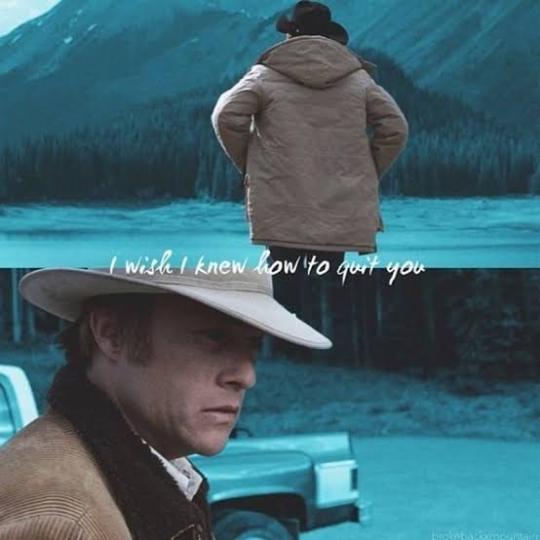
#movie brokebackmountain moviethoughts homophobia realityorimaginary loveislove crimeonlove film cinema thoughts mytakeonmovie#movies#film#cinema#homophobia#cowboys#thoughts#movie thoughts#movie explained#loveislove#slotted angle racks#ang lee#jake gylenhall#heath ledger#writer on tumblr#philosophy#movie history
9 notes
·
View notes